最新中考英语重点词汇复习:浅谈BUT的用法精编版
but的用法及考点
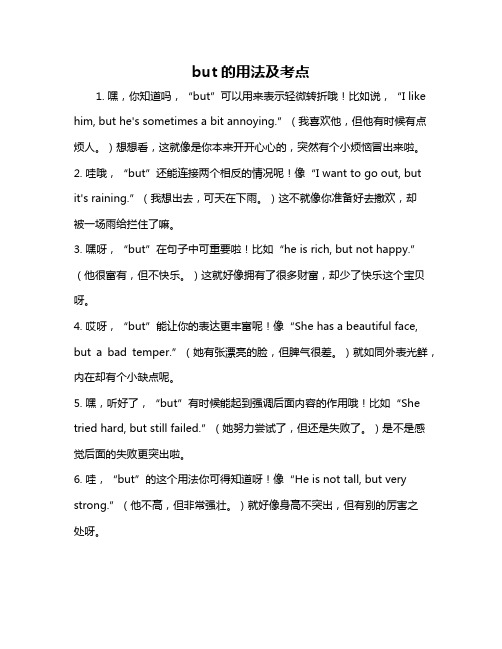
but的用法及考点1. 嘿,你知道吗,“but”可以用来表示轻微转折哦!比如说,“I like him, but he's sometimes a bit annoying.”(我喜欢他,但他有时候有点烦人。
)想想看,这就像是你本来开开心心的,突然有个小烦恼冒出来啦。
2. 哇哦,“but”还能连接两个相反的情况呢!像“I want to go out, butit's raining.”(我想出去,可天在下雨。
)这不就像你准备好去撒欢,却被一场雨给拦住了嘛。
3. 嘿呀,“but”在句子中可重要啦!比如“he is rich, but not happy.”(他很富有,但不快乐。
)这就好像拥有了很多财富,却少了快乐这个宝贝呀。
4. 哎呀,“but”能让你的表达更丰富呢!像“She has a beautiful face, but a bad temper.”(她有张漂亮的脸,但脾气很差。
)就如同外表光鲜,内在却有个小缺点呢。
5. 嘿,听好了,“but”有时候能起到强调后面内容的作用哦!比如“She tried hard, but still failed.”(她努力尝试了,但还是失败了。
)是不是感觉后面的失败更突出啦。
6. 哇,“but”的这个用法你可得知道呀!像“He is not tall, but very strong.”(他不高,但非常强壮。
)就好像身高不突出,但有别的厉害之处呀。
7. 哈哈,“but”真的超有用的!例如“She said she would come, but she didn't.”(她说她会来,但她没来。
)这不就是说了却没做到嘛。
总之,“but”的用法很多,学会了能让我们的英语表达更地道、更生动呀!。
but用法总结
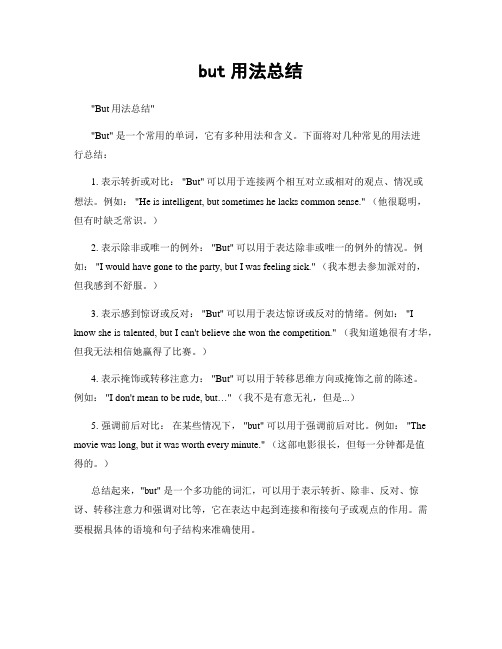
but用法总结"But用法总结""But" 是一个常用的单词,它有多种用法和含义。
下面将对几种常见的用法进行总结:1. 表示转折或对比: "But" 可以用于连接两个相互对立或相对的观点、情况或想法。
例如: "He is intelligent, but sometimes he lacks common sense." (他很聪明,但有时缺乏常识。
)2. 表示除非或唯一的例外: "But" 可以用于表达除非或唯一的例外的情况。
例如: "I would have gone to the party, but I was feeling sick." (我本想去参加派对的,但我感到不舒服。
)3. 表示感到惊讶或反对: "But" 可以用于表达惊讶或反对的情绪。
例如: "I know she is talented, but I can't believe she won the competition." (我知道她很有才华,但我无法相信她赢得了比赛。
)4. 表示掩饰或转移注意力: "But" 可以用于转移思维方向或掩饰之前的陈述。
例如: "I don't mean to be rude, but…" (我不是有意无礼,但是...)5. 强调前后对比:在某些情况下, "but" 可以用于强调前后对比。
例如: "The movie was long, but it was worth every minute." (这部电影很长,但每一分钟都是值得的。
)总结起来,"but" 是一个多功能的词汇,可以用于表示转折、除非、反对、惊讶、转移注意力和强调对比等,它在表达中起到连接和衔接句子或观点的作用。
but的用法句型
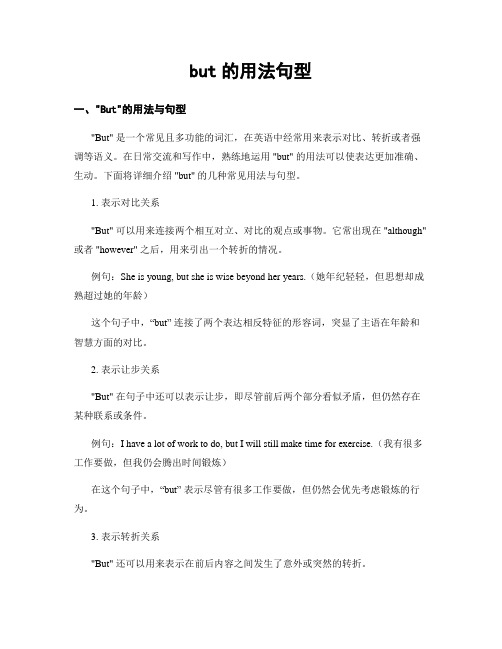
but的用法句型一、"But"的用法与句型"But" 是一个常见且多功能的词汇,在英语中经常用来表示对比、转折或者强调等语义。
在日常交流和写作中,熟练地运用 "but" 的用法可以使表达更加准确、生动。
下面将详细介绍 "but" 的几种常见用法与句型。
1. 表示对比关系"But" 可以用来连接两个相互对立、对比的观点或事物。
它常出现在 "although" 或者 "however" 之后,用来引出一个转折的情况。
例句:She is young, but she is wise beyond her years.(她年纪轻轻,但思想却成熟超过她的年龄)这个句子中,“but” 连接了两个表达相反特征的形容词,突显了主语在年龄和智慧方面的对比。
2. 表示让步关系"But" 在句子中还可以表示让步,即尽管前后两个部分看似矛盾,但仍然存在某种联系或条件。
例句:I have a lot of work to do, but I will still make time for exercise.(我有很多工作要做,但我仍会腾出时间锻炼)在这个句子中,“but” 表示尽管有很多工作要做,但仍然会优先考虑锻炼的行为。
3. 表示转折关系"But" 还可以用来表示在前后内容之间发生了意外或突然的转折。
例句:We were planning to go for a hike, but it started raining.(我们计划去远足,但天突然下雨了)这个句子中,“but” 引出了一个令人意外的转折情况,导致原本计划中的活动不能进行。
4. 表示强调"But" 可以用来引出一个让前面已经提到的事实更加显著或重要的观点。
but的用法归纳总结
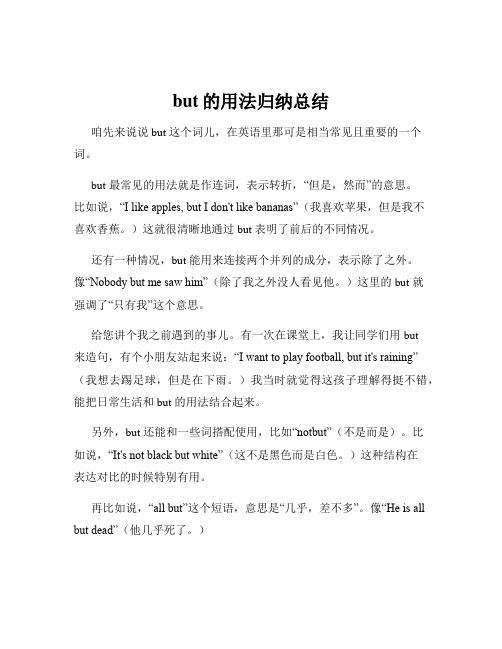
but的用法归纳总结咱先来说说 but 这个词儿,在英语里那可是相当常见且重要的一个词。
but 最常见的用法就是作连词,表示转折,“但是,然而”的意思。
比如说,“I like apples, but I don't like bananas”(我喜欢苹果,但是我不喜欢香蕉。
)这就很清晰地通过 but 表明了前后的不同情况。
还有一种情况,but 能用来连接两个并列的成分,表示除了之外。
像“Nobody but me saw him”(除了我之外没人看见他。
)这里的 but 就强调了“只有我”这个意思。
给您讲个我之前遇到的事儿。
有一次在课堂上,我让同学们用 but来造句,有个小朋友站起来说:“I want to play football, but it's raining”(我想去踢足球,但是在下雨。
)我当时就觉得这孩子理解得挺不错,能把日常生活和 but 的用法结合起来。
另外,but 还能和一些词搭配使用,比如“notbut”(不是而是)。
比如说,“It's not black but white”(这不是黑色而是白色。
)这种结构在表达对比的时候特别有用。
再比如说,“all but”这个短语,意思是“几乎,差不多”。
像“He is all but dead”(他几乎死了。
)还有“but for”,要是没有,要不是。
“But for your help, I couldn'thave finished the work on time”(要不是你的帮助,我不可能按时完成工作。
)记得有一回我批改作业,有个同学写了这样一个句子:“I havemany friends, but few true ones”(我有很多朋友,但是真心的没几个。
)我给他画了个大大的勾,还在旁边写了句评语夸他用得好。
总的来说,but 的用法挺多的,但只要咱们多留意、多练习,就能熟练掌握它。
就像咱们学走路一样,一开始可能摇摇晃晃,但坚持下去就能稳稳当当啦!希望大家以后在使用 but 的时候都能得心应手,让英语表达更加准确、自然。
初中英语,高频词but用法及考点全面解析.doc

初中英语,高频词but用法及考点全面解析这个词是大家在英语学习的过程中,使用频率特别高的一个,从我们接触英语开始,经常会用到它。
今天之所以把它拿出来单独讲,是因为除了使用它的频率高,更重要的是它的用法非常广泛,当然考查的内容也就多。
but这个词用法比较复杂,它可以做连词、副词、介词等。
而且它还可以构成许多固定搭配、连接并列句、引导多种从句等。
接下来我们就一起来看一下它的用法:第一,作介词的用法1、but作介词的时候,经常会与nobody, nothing, no, none, who 等这些词连用意思是“除了,除……之外,”表示从同类的一个整体当中除掉一部分。
大家可以看下面这两个例句来体会一下:2、大家在使用的时候要注意,它的前面如果有do的某种形式,比如像did或者是does,这个时候它的后面要省略to;如果没有的话,它的后面就要带上to。
大家不需要过多去强化记忆这个知识点,只要记住下面两个例句,就能轻松掌握。
第二,作连词的用法but作连词的时候,大家需要记住三个用法:其中一个是它所连接的两个词、短语或者连接从句前后是相互对立的,可以翻译成“但是,然而,可是” 的意思。
这个用法可以说是最简单也是最常用的,比如下面这两个句子:它的另一个用法是引导从句,与前面的否定词相对应,可以翻译成“无……而不……;……的话,必定……”的意思,大家可以记住下面两个句子:它的最后一个用法是用在表示歉意的话之后,可以表示有礼貌的拒绝,也可以表示不赞同。
是一种很委婉的表达。
比如下面两个例句:第三,作副词的用法作副词主要有两个用法,一个是相当于only, just, 意思是“只能、仅仅、不过”,后面经常跟动词或者是名词;它的另一个用法是用在can 的后面,意思是“只能”;用在cannot的后面,意思是“不得不”,我们看下面的例句讲解:第四,习惯用法but的习惯用语有很多,我们来看最常用的这几个:1、but…that相当于if…not虚拟条件从句,意思是,“要不是,若非……”;2、but for,它的意思相当于without,后面经常接名词、动名词、代词,多用于虚拟语气,意思是,“要不是……早就……,如果没有……,若非……就”;3、nothing but意思是“只不过”;not… but… 意思是“不是……而是……”,连接两个并列成分;anything but意思是,“决不,一点儿不”,经常用它来加强语气,用在动词之后;如下面的例句:4、not only…but also…意思是“不但……而且……,既……又……,”同样连接两个并列成分,我们一起看一下例句:。
but在英语中的用法

but在英语中的用法如下:
1. 表示“除了”,后接名词、代词、分词或从句等。
2. 表示“不同于”,常用句型为“it is different from+名词/代词/动名词”。
3. 表示“只有”,常用句型为“not but that...”。
4. but作并列连词时,可以连接两个并列的词、短语或句子,表示“但是,然而”等。
5. but作为介词时,表示“除…之外”,后接名词或代词。
6. but作副词时,可以用来修饰动词(be+doing),意思是“只不过”。
7. but作名词时,意思是“转折”,在句中作连词用,表示转折关系;意思是“借口”,在句中作名词,表示用途。
例如,He is young but he knows much. 这句话的意思是:他虽然年轻,但知道的东西却很多。
另外,“not but that...”的用法比较特殊,表示的是虽然情况并非如此,应引起注意。
在这个语境中,“not”可以作为转折的含义去理解,“but”引出重点内容或补充信息。
此外,还常用在口语中表达“毫无疑问”,作连词和短语(“But that”短语中的but不表转折含义)都是这个意思。
希望以上信息对您有所帮助,如果您还有其他问题,欢迎告诉我。
but的用法和词汇

but的用法和词汇"但"是一个连词,常用于引入一个相对于前面所说的内容相对立的内容。
它可以用来对比、转折或表示相反的观点、情况或行为。
以下是一些常见的用法和相关词汇:1. 转折用法:- 他虽然努力了,但没有取得好成绩。
(although)- 她很聪明,但有时候很懒散。
(but sometimes)- 我们计划去旅行,但天气不好。
(but the weather)2. 对比用法:- 我喜欢音乐,但我不喜欢跳舞。
(but I don't like dancing)- 这件衣服很漂亮,但太贵了。
(but it's too expensive)- 她长得很美,但性格却很内向。
(but she's introverted)3. 表示相反观点或情况:- 我们应该保护环境,但很多人并没有意识到这一点。
(but many people are not aware of this)- 这本书很有趣,但结局太草率了。
(but the ending is rushed) - 他决定辞职,但我认为这是一个错误的决定。
(but I think it's a wrong decision)相关词汇:- 但是 (dànshì):but, however- 不过 (búguò):but, however- 然而 (rán'ér):however, nevertheless- 可是(kěshì):but, yet- 尽管(jǐnguǎn):although, even though。
but的用法的总结最佳

but的用法的总结最佳一、介绍but的基本含义和用法(200字左右)"But" 是一个常见的英语连词,可以用于多种复杂句型中,增加句子之间的关联关系。
它有时候表示转折或者对比关系,在这些情况下,通常放在句子中间;同时,它也可以表达选择关系,表示两个相互矛盾的观点或者行为。
二、示例说明but的转折关系用法(500字左右)1.但是可以引导两个意思相反或情感不同的句子。
例如:“她工作很辛苦,但是她从不抱怨。
”其中,“但是”表达了前后两个句子之间的转折关系。
2.但是也常用来表达让步关系。
例如:“虽然他没接到邀请函,但是他还是去参加了晚宴。
”这里,“但是”表示尽管某一条件可能与结果相矛盾,仍然采取了某种行动。
3.除此之外,“不仅……而且……”结构中同样可以使用but。
例如:“他不仅在学校上课努力学习,而且还参加各种社区活动。
”这里,“而且”强调了两件事情的并存,并且通过but将原本可能看似矛盾的成分联系在一起。
三、but表示对比关系用法(500字左右)1.在表达对比的情况下,常常使用关键词“不同于”或者“不像”的形式,再加上but。
例如:“这家饭店的服务态度很好,但是价格实惠。
”表明了服务质量和价格之间的对比。
2.当我们用一个肯定句或者否定句后面接上but时,可以使得前后两个句子形成鲜明的对比。
例如:“她以前几乎什么也不懂,但是现在成为了一名优秀的画家。
”其中,“以前什么也不懂”与“现在成为一名优秀画家”形成了强烈的反差。
3.同时,在引导并列句时,可以使用but来强调两种选择或观点之间的区别。
例如:“有些人喜欢夏天游泳,而有些人却更喜欢冬天滑雪。
”这里,“而”本身相当于but,并且突出了夏天游泳和冬天滑雪之间的选择性。
四、总结but的各种用法(200字左右)“But” 是一个极其常见且灵活多变的连词,在英语写作中经常被使用。
它可以引导转折关系,表达对比关系,以及选择关系。
通过合理运用but,能够增加句子之间的逻辑连贯性,使文章更加丰富有力。
but的用法
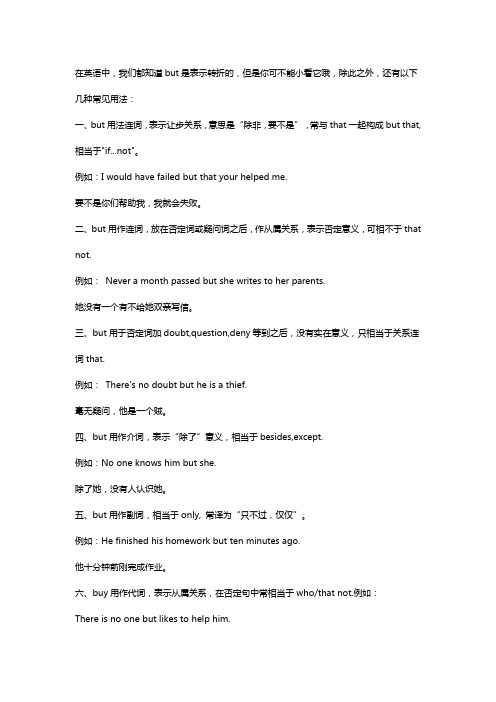
在英语中,我们都知道but是表示转折的,但是你可不能小看它哦,除此之外,还有以下几种常见用法:一、but用法连词,表示让步关系,意思是“除非,要不是”,常与that一起构成but that, 相当于"if...not"。
例如:I would have failed but that your helped me.要不是你们帮助我,我就会失败。
二、but用作连词,放在否定词或疑问词之后,作从属关系,表示否定意义,可相不于that not.例如:Never a month passed but she writes to her parents.她没有一个有不给她双亲写信。
三、but用于否定词加doubt,question,deny等到之后,没有实在意义,只相当于关系连词that.例如:There's no doubt but he is a thief.毫无疑问,他是一个贼。
四、but用作介词,表示“除了”意义,相当于besides,except.例如:No one knows him but she.除了她,没有人认识她。
五、but用作副词,相当于only, 常译为“只不过,仅仅”。
例如:He finished his homework but ten minutes ago.他十分钟前刚完成作业。
六、buy用作代词,表示从属关系,在否定句中常相当于who/that not.例如:There is no one but likes to help him.没有人不认识他。
动词搭配1. add to增加,增进add … to把…加进…add up相加add up to总计,所有这一切说明1) I don't think these facts will ________ anything.2) Fifty new books have been ________ the library.3) The music _________ our enjoyment of the film.4) You must have made a mistake when you _______ the bill ________.( add up to, added to, add to, added…up )2. break away from打破,脱离,挣脱,改掉break down出毛病,身体(精神)衰弱,分解,拆开break off暂停,中断break in强行进入,插话break into闯入break into pieces成为碎片break out爆发break up捣碎,驱散,瓦解,学期结束,拆散break through突破1) The criminal managed to break _______ ______ the police and ran into the woods.2) When he heard the news, he broke _______ and cried.3) Don't break ________ while others are speaking.4) Why don't you break ________ for a few minutes and have some coffee?5) When does school break ________?6) After harvest we break _________ the soil with a tool pulled by two oxen. ( away from, down, in, off, up, up )3. bring up抚养,呕吐,提出bring about造成bring out拿出,出版bring in引入,引进,挣钱bring back使回想起bring down使下降,使倒下1) The shopkeeper brought his price _________ to only five dollars.2) The school has brought _________ new foreign teachers to teach oral English.3) The song brought ___________ happy memories of our schooldays.4) Do you know what brought ___________ this misunderstanding?5) The kind old man agreed to bring __________ the young orphan.6) We decided to bring the matter ___ at the next meeting.7) The wind brought _______ a lot of trees last night.8) Next month they will bring ________ a new edition of the book.( down, in, back, about, up, up, down, out )4. call on号召,拜访(某人)call at拜访、参观(某地)call for去叫某人, 要求, 需要call up使回忆起, 征召入伍call in召集,请某人来call out大喊,高叫call off取消,不举行1) Doctors are often called _____ in the middle of the war.2) Please wait for me at home. I'll call _______ you at your house at seven tonight.3) The trains calls _______ several big cities between Beijing and Guangzhou.4) He called her name __________, but she didn't answer.5) The sports meet was called ____ on account of the rain.( in, for, at, out, off)5. come about发生,出现come down下跌,落,降,传下来come in进来come into (sight/being/existence/use/notice/effect)come on来临/ 快点come out出版,结果是come along一道来,赶快come to达到(an end/an agreement/a stop)苏醒,合计,总共是come over走过来come up发芽,走近come across偶然碰到come back回想起come from来自,源自1) I come _________ the book I lent you last month.2) How did it come _________ that you both got lost? I thought you had a map.3) It suddenly came _________ to me where I had seen the boy before.4) Come __________ now, or else we shall be late.5) He came __________ me like a tiger.6) The price of petrol has come _________ since the beginning of this year.7) The word came __________ use many years ago.8) When the examination result came _________, he had already got a job.9)The bill came __________ over a thousand dollars.10) I sowed the seeds over a month ago, but they haven't come __________ yet. ( for, about, back, on, at, down, into, out, to, up )6. cut across抄近路cut down砍倒,削减cut off切断,割掉,断绝关系cut up连根拔除,切碎through剪断,凿穿cut out删(省)掉,戒掉cut in插嘴1) Don't cut ___ this tree. It will be very shady in summer.2) You must cut ________ the number of cigarettes you smoke, or it will cause illness.3) We decided to cut _________ the moor(旷野)to the village.4) Cutting the tree ____ means cutting the tree into pieces.5) The electricity was cut ___________ when the lady refused to pay the bill.6) We were having a pleasant conversation when T om cut __________.(down, down, across, up, off, in )7. die of (disease/hunger/grief/old age)死于(疾病,饥饿,寒冷,情感原因)die from死于(意外事故、情形)die away渐渐消逝die out绝种die down(炉火)渐熄die off逐一死去8. fall behind落后fall over one's feet 跌跤fall down掉下,跌倒fall back撤退,后退1) Babies often fall _____ when they are learning to walk.2) Our team seems to have fallen __________ the others.3) As soon as the enemies fell __________, the people returned to their village.4) She fell__________ the bench and had her leg broken.(down, behind, back, over )9. go in for从事,喜爱,参加go through通过,经受go over复习,检查go up(价格)上涨,建造起来go after追捕,追赶go against违反go ahead先行,开始吧,问吧,说吧go away离开go by时间过去go down下沉,降低,(日、月)西沉go on(with)继续进行go with相配,陪同go without没有,缺少go out外出,熄灭go all out全力以赴go off爆炸,进行,变坏,断电,停止供应go back on背约,食言go beyond超出1) Many new factories have gone __ in the past few years.2) Rents have gone __________ greatly recently.3) Many years have gone ___________ since we first met.4) Let's continue our journey until the sun goes _______.5) His actions went ___________ the will of the people,6) I can't do it, for it goes ___________ my duty.7) Over 100 students went ____________ this entrance examination.8) The bomb went ____________ and killed ten people.9) The buyer went ___________ the car carefully before reaching a decision.10) This tie doesn't go ___________ my blue shirt.11) If you think you can solve the problem, go ______.12) Many students went __________ playing basketball.(up, up, by, down, against, beyond, through, off, over, with, ahead, in for ) 10. get down下来,记下,使沮丧get down to致力于,专心于get on进展,进步,穿上,上车get off脱下,下车get in收集,插(话)get away逃跑,逃脱,去休假get over忘记,越过,克服,从疾病中恢复get along with进展,相处get up起床get through打通电话,完成,通过get round消息传开get close to sth. 接近,几乎get into (trouble)get to (know)get back取回,收回get out1) She spoke so fast that I couldn't get ____ what he said.2) We will find ways to get _________ difficulties.3) The story has got __________, and everyone knows about it.4) When I get _________ with the report, I'll go to the cinema.5) After a delicious meal the two men got __________ to business.6) Don't always get __________ a word when others are speaking.7) It took me a long time to get ___________ such an unpleasant experience. (down, over, round, through, down, in, over)11. give away赠送,泄露,出卖give out发出,疲劳,分发,公布give off发出(光、热、气体)give in (to sb.) 屈服give up放弃,让(座位)1) His accent at last gave him __________.2) The liquid gave ________ a strong smell.3) The headmaster gave ___________ the names of the prize-winners.4) The soldiers gave _________ the town to the enemies.5) Who will help me to give the books ___________?6) Don't believe in those who give his friends ________.7) After a long walk, my strength gave ____________.(away, off, out, up, out, away, out)12. hand in交上,提交hand out分发hand down流传,遗传13. hang about闲逛hang up挂电话14. hold back阻止,隐瞒hold up举起,使停顿hold on别挂电话,等,坚持hold out持续,坚持,伸出hold down控制,镇压1) I'm sure he is holding something _________.2) She managed to hold ______ her emotion until her guests had left. Then she cried.3) Tell him to hold ________ a moment. I'll come soon.4) Our food supply won't hold _________ for more than a few days.5) The train was held ________ as a result of the floods.6) These measures helped to hold ___________ the city's population.7) Hold ___________ your left arm, please.(back, back, on, out, up, down, up)15. keep up (courage, English, spirits)保持,keep up with跟上keep off (grass)不接近,离开keep away from避开,不接近,离…远远的keep out ofkeep to (rules, promise)坚持,遵守keep on继续,坚持下来keep back阻止,留下,隐瞒,扣下keep from克制,阻止1) The angry lady told the strangers to keep ________ from her.2) I can hardly keep ________ my tears after hearing his words.3) Only pride kept her __________ bursting into tears.4) I can scarcely keep __________ asking him what he has done.5) "Don't touch me," screamed the woman, "Keep __________!"6) Keep _________ until you succeed.7) Keep _________ your courage, and you'll succeed in the end.8) The thick coat can keep the cold ___________.9) Always try to keep ___________ the rules when you play a game.10) I can't keep ________ with everything you're doing. (away, back, from, from, off, on, up, out, to, up)16. knock at/on敲knock into撞到某人身上knock down撞倒knock out of把…敲出knock over撞倒knock off停止工作,休息1) The boxer soon knocked his opponent _________.2) The office stuff knocks _________ at six every day.3) Try knocking __________ the window and see if there is anyone indoors.4) He was so absorbed in his book that he knocked __________ the car parked there. (down, off, on, into)17. leave for离开前往leave out删去,遗漏leave behind遗留,忘记拿走leave to留给,遗嘱赠于leave over遗留,剩下,延期1) "Whose name has been left __________?" demanded the teacher.2) When he died, he left all his property _____ his niece.3) He suddenly realized that he had left his umbrella ___________.4) Don't leave this matter _________ until tomorrow.5) Leave some meat ___________ for tomorrow.6) Those are questions left _________ by history.(out, to, behind, over, over, over)18. look up查找,向上看look through翻阅,浏览look on旁观look on…as看作look into调查look after/ at / for 照顾/看/寻找look out(for)当心look about / around/round四下查看look down upon瞧不起look back upon回忆,回顾look ab. up and down仔细打量某人look ab in the face/eyes直视某人1) I spent two hours looking ______ the students' papers.2)Look _______! There is a big hole in front.3) He took part in the game, and the rest of us just looked ______ and cheered for him.4) The old man looked _____ upon the days of his youth.5) She was so snobbish(势利)that she looked __________ upon all his neighbours.6) The police promised to look __________ the case as soon as possible.7) He looked __________ but saw nobody, and he listened but hear nothing. (through, out, on, back, down, into, about/around/round)19. make up编造,配制,打扮,组成make up for弥补make into / of / from 制成make out弄懂,发现,看出,填写,开列(清单)make for走向,驶往,促使1) Can you make this length of cloth __________ a suit?2) I asked the driver if he was making ___________ London?3) My father made __________ a check for me to buy the camera.4) We must make the loss _________ next week./ He tried hard to make ________ for the damage he had done.5) He made __________ a story, which I found hard to believe.6) Someone is coming, but I can't make ___________ who it is.(into, for, out, up/up, up, out)20. pass away去世pass by经过pass down(on)…to传给pass through经历pass over漠视,忽视1) The old clock has been passed ________ to me from my grandfather's grandfather.2) The man passed ___________ last week in peace.3) We are passing ____________ difficult times.4) The secretary passed ___________ the details in the first part of his report. (down, away, through, over)21. pay back还钱,报复pay for付钱,为…受到惩罚,因…得到报应pay off还清1) How much did you pay __________ the dictionary?2) You should pay _________ the money you borrowed from me.3) I'll pay him ____________ for all his crimes(罪行) against me.4) Some day, you'll pay __________ what you have done today.5) Has she pay ____________ the debt yet?(for, back, back, for, off)22. pick up拾起,获得(information),接人,站起,收听,自然习得(language /knowledge),恢复重获(pick up health)pick out挑选,辨认,看出1) I picked the information __________ while waiting in the queue.2) My friend has arranged to pick me _________ at 6:00.3) The patient has picked _________ health during the last two weeks.4) She picked _______ the most expensive pair of shoes.5) I can't pick John ___________ in the crowd.6) Can I pick __________ VOA with this short-wave radio?7) He fell down suddenly, but picked himself ___________ quickly.(up, up, up, out, out, up, up)pick cotton/flower/leaves/words选词23. put up搭起,张贴,举起,安装,投宿,安排住下put up with忍受put out伸出,扑灭put off推迟put into放进,翻译put away放好,存钱put down记下,平息put on穿戴,上映,增加(put on weight/speed)put forward 提出,提前put through 接通电话put aside放到一边put back放回1) He put _________ half his wage every week.2) The government soon put __________ the revolt(暴乱).3) Put your watch __________. It's slow.4) He put __________ his hand for me to shake.5). Please put me __________ to Extension(分机)2.6) We put ___________ for night at the village inn.7) He is very proud, and he often put _________ airs.(摆架子)8) We had a telephone put _____________ in our office.9) I can't put __________ with your laziness.(away, down, forward, out, through, up, on, up, up)24. pull down拆掉,推翻pull on匆匆穿上/ off 脱pull in进站pull out取出,(火车)离站pull down往下拉,拆毁pull over驶到一边pull through恢复健康,渡过难关,脱离险境pull up(使)停住1) The train slowly pulled __________ and disappeared in the distance.2) All the old houses here have now been pulled ______, and new ones are to be built.3) The car pulled _________ when I blew the horn.4) The doctor thinks the man will pull __________.5) The driver pulled ________ at the traffic lights.(out, down, over, through, up)25. push over推倒,刮倒push ahead(on, forward)继续前进,坚持下去push through排除困难办好谋事,努力设法通过,挤过1) We've decided to push __________ with our plan to build a new road2) Many trees were pushed __________ in the hurricane.3) They were determined to push the new rules ________ at any cost..4) Take care not to push the baby _________.5) They pushed ___________ the crowd and at last reached us.(on, over, through, over, through )26. run across偶然碰到run after追逐,追捕run away逃跑run for竞选run into偶然碰到(困难)遇见(人),相撞run out of用完1) If you drive so fast, you'll run _________ someone some day.2) I ran __________ a friend of mine in the exhibition.3) Our water has run __________. Can you fill up some more bottles?4) Why do you always run __________ adventure?5) He didn't want to run ___________ president that year.6) In that way you will only run __________ difficulties.( into, across/into, out, after, for, into)27. see off送行see through看透,识破see to照料,照管28. send for派人去请send off送行send out发出(光亮)等send up发射29. set up建立set off出发,触发,引起set out动身,着手(to do),陈述set about开始着手(doing)set to work(n.)开始做set back拨回,使推迟1) I shall set my watch ___________ by five minutes.2) We set __________ reading the text aloud immediately the bell rang.3) We set _________ at daybreak yesterday and we've been travelling ever since then.4) I set __________ to advise him not to drink.5) What were the reasons he set ___________ in his report?6) The president set __________ a special group of soldiers to guard him.7) The unpopular law set _________ a series of protests.(抗议)(back, about, off/out, out, out, up, off)30. take off脱掉,起飞take on呈现雇佣take away拿走take in吸收,领会take up从事,占用(时间空间)take down记录,取下take back收回take for误认为take along随身带take over接管take out1) I take _________ all I said about his dishonesty.2) He went to the shelf and took __________ a book of poems.3) At first I took him _________ a doctor.4) I can see that most of you have taken ________ everything that the teacher taught.5) Bill has now taken __________ his father's business.6) My job takes __________ most of my time.7) The boss took ____________ twenty people for his new company.(back, down, for, in, over, up, on)take charge of负责, take sth. for granted想当然, take hold of抓住, take pride in 以… ……为自豪, take the place of, 代替take turns to do轮流做, take office就职31. think of想起think of…as把…看作think out想出think up想出think about考虑think over仔细考虑think well of sb. 对某人看法好32. turn off / on打开turn over翻身,反复考虑,翻(书页),翻转turn out证明为,结果,制造成品turn to转向,求助turn down调低,拒绝turn against变得敌视,反对turn away打发走,驱逐,转过脸去turn back返回,转回去turn round转过身来turn up向上翻,露面,出现,音量调大turn in上缴turn upside down把倒置,弄得乱七八糟1) The child turned __________ its mother for comfort.2) Turn ___________ and let me see your face.3) However much he turned the problem ________ in mind, he could find no satisfactory solution.4) The English evening party turned _________ a great success.5) The sight of the accident was too much for her to bear, and she turned _______.6) The football stadium was full, and many people had to be turned __7) The army turned him ___________ on account of (因为) his poor health.8) She turned the whole house ___________ in her search for her missing purse.9) Where did your purse turn ____________? I found it in the snow.10) The villagers suddenly turned __________ the foreigners who lived nearby.11) The factory turns ____________ 2000 new cars last year.(to, round, over, out, away, away, down, upside down, up, against, out)。
干货:but介词(除以外)的用法与搭配(全网第2全)
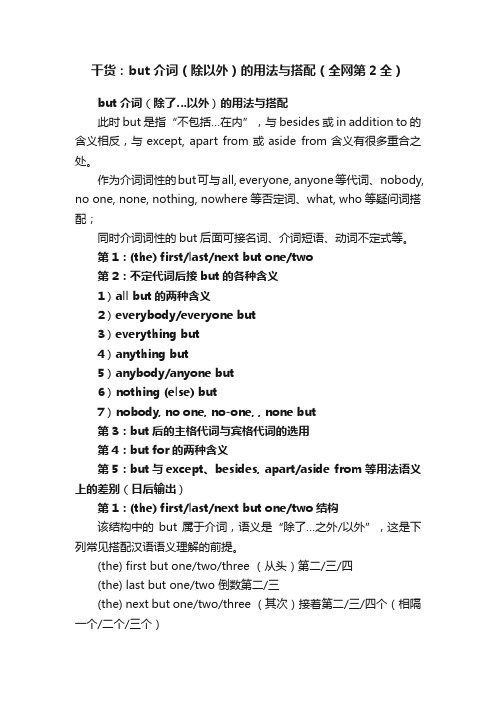
干货:but介词(除以外)的用法与搭配(全网第2全)but介词(除了…以外)的用法与搭配此时but是指“不包括…在内”,与besides或in addition to的含义相反,与except, apart from或aside from含义有很多重合之处。
作为介词词性的but可与all, everyone, anyone等代词、nobody, no one, none, nothing, nowhere等否定词、what, who等疑问词搭配;同时介词词性的but后面可接名词、介词短语、动词不定式等。
第1:(the) first/last/next but one/two第2:不定代词后接but的各种含义1)all but的两种含义2)everybody/everyone but3)everything but4)anything but5)anybody/anyone but6)nothing (else) but7)nobody, no one, no-one, , none but第3:but后的主格代词与宾格代词的选用第4:but for的两种含义第5:but与except、besides, apart/aside from等用法语义上的差别(日后输出)第1:(the) first/last/next but one/two结构该结构中的but属于介词,语义是“除了…之外/以外”,这是下列常见搭配汉语语义理解的前提。
(the) first but one/two/three (从头)第二/三/四(the) last but one/two 倒数第二/三(the) next but one/two/three (其次)接着第二/三/四个(相隔一个/二个/三个)but one/two/three 第二/三/四第2:不定代词后接but的各种含义《牛津英语用法指南》(第三版)第148页but词条1用法在all, none, every, any, no(以及everything, everybody, nothing, nobody, anywhere等)之后,可以用but来表示except的意思。
but除了的用法

but除了的用法But除了是英语中的一个常用的连接词,它可以用来表达相反的观点或者补充说明观点。
But除了在句子中起到连接词的作用,它也可以用来表达让步、比喻或者提出建议等意思。
下面就详细介绍but 除了的用法。
一、表达相反的观点表达相反观点是but除了最基本而且最常见的用法。
它可以用来表达与前一句话意思相反的观点,用来表示一种思维判断,但又不是完全不同的意思。
例如:John is usually very organized, but lately he’s been very forgetful.John通常很有条理,但是最近他变得很健忘了。
She is usually a very calm person, but when she’s angry she can be very aggressive.她通常是一个很冷静的人,但是当她生气的时候可以很有攻击性。
That restaurant is usually very busy, but today it’s surprisingly empty.这间饭店通常很热闹,但是今天出乎意料的是空荡荡的。
二、表达让步But除了也可以用来表达让步。
表达让步意思是指,前一句说的是某一情况,但是后一句说出来的却是另一个完全不同的情况,尽管前后句之间存在矛盾,但是表示一种让步关系。
例如:His work was usually of very poor quality, but occasionally he had flashes of brilliance.他的工作质量通常很差,但是偶尔也会有一些闪光的时候。
It’s a difficult problem, but with enough effort we might be able to find a solution.这是一个很难的问题,但是只要我们足够努力,也许能够找到解决方法。
He can be very stubborn, but if you explain the situation carefully he will usually listen.他可能会很固执,但是只要你仔细地解释情况,他通常会听从的。
but_的用法
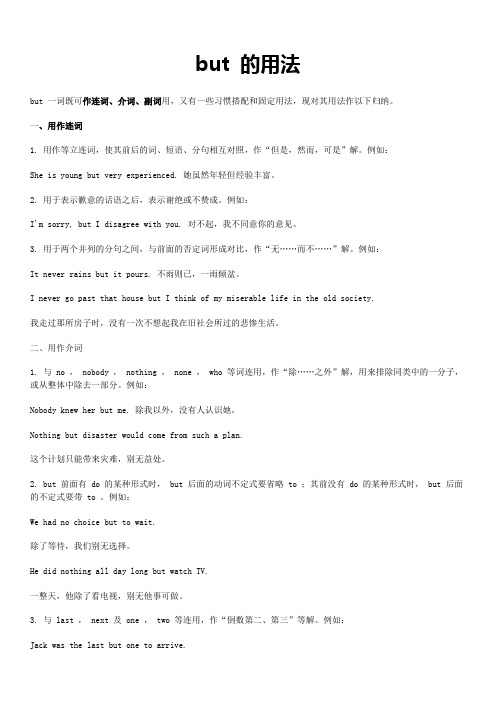
but 的用法but 一词既可作连词、介词、副词用,又有一些习惯搭配和固定用法,现对其用法作以下归纳。
一、用作连词1. 用作等立连词,使其前后的词、短语、分句相互对照,作“但是,然而,可是”解。
例如:She is young but very experienced. 她虽然年轻但经验丰富。
2. 用于表示歉意的话语之后,表示谢绝或不赞成。
例如:I'm sorry, but I disagree with you. 对不起,我不同意你的意见。
3. 用于两个并列的分句之间,与前面的否定词形成对比,作“无……而不……”解。
例如:It never rains but it pours. 不雨则已,一雨倾盆。
I never go past that house but I think of my miserable life in the old society.我走过那所房子时,没有一次不想起我在旧社会所过的悲惨生活。
二、用作介词1. 与 no , nobody , nothing , none , who 等词连用,作“除……之外”解,用来排除同类中的一分子,或从整体中除去一部分。
例如:Nobody knew her but me. 除我以外,没有人认识她。
Nothing but disaster would come from such a plan.这个计划只能带来灾难,别无益处。
2. but 前面有 do 的某种形式时, but 后面的动词不定式要省略 to ;其前没有 do 的某种形式时, but 后面的不定式要带 to 。
例如:We had no choice but to wait.除了等待,我们别无选择。
He did nothing all day long but watch TV.一整天,他除了看电视,别无他事可做。
3. 与 last , next 及 one , two 等连用,作“倒数第二、第三”等解。
But一词在英语句子中的不同用法及翻译

内容摘要“But”是一个十分常用的词,可以表示许许多多不同的意思,但它的用法十分复杂。
它既可以作连词、介词、副词及代词,又可以和其它词组合构成短语。
But用作等立连词,作“但是,然而,可是”解;当作介词时,作“除了, 除了…之外”解;当作副词时,作“只, 仅仅, 不过”,或“几乎, 差不多”,或“彻底地, 完全地”解。
But还可以用在其他一些结构中。
由于其用法比较复杂,给我们的翻译及正确运用带来了很大的困难。
这里根据本词的功能从四个方面较为深入的论述其用法及其翻译。
关键词:but 用法意思翻译Abstract“But” is a very common word in English with a lot of meanings. It is no doubt th at there is a “but” in each essay. However, its usages are rather complicated it has diff erent meanings when used as a conjunction, a preposition, an adverb, a pronoun respe ctively. When used as a conjunction, “but” could be translated into “但是, 然而, 而是”; when used as a preposition, it could be translated into “除了,除了…之外”; when used as an adverb, it could be translated into “只, 仅仅, ”, or “几乎”, or “彻底地, 完全地”;“But” can be collocated with other structures as well. The diversities of the usages make us quite difficult to understand, to use and to transl ate it correctly.This essay is based on fourparts of speech and will give a clear explana tion of the usages of “but” with examples, as well as its translationsKey Words :but; usage; meaning; translation提纲一引言1,研究的目的2,简述but在英语中的几点用法二详述but在英语中的几点用法及翻译1,作连词解时的用法2,作介词解时的用法3,作副词解时的用法4,习惯短语三结束语But 一词在英语句子中的不同用法及翻译一、引言But在英语中是一个及其普通的英语单词,在不同句子,不同情形下,but有不同用法及翻译。
BUT的所有用法
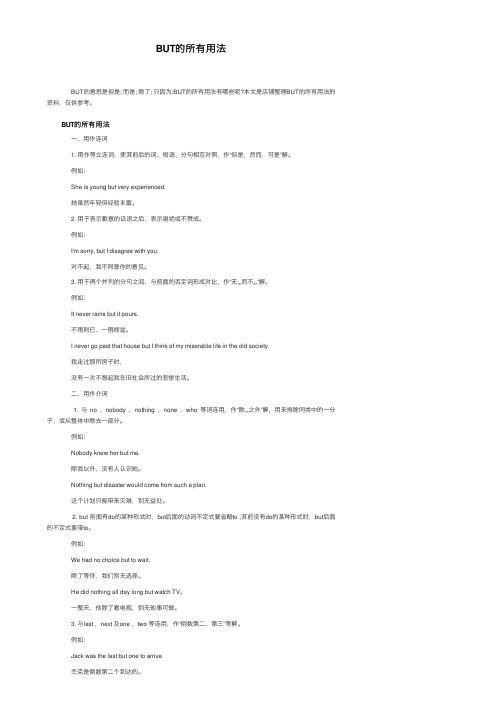
BUT的所有⽤法 BUT的意思是但是; ⽽是; 除了; 只因为;BUT的所有⽤法有哪些呢?本⽂是店铺整理BUT的所有⽤法的资料,仅供参考。
BUT的所有⽤法 ⼀、⽤作连词 1. ⽤作等⽴连词,使其前后的词、短语、分句相互对照,作“但是,然⽽,可是”解。
例如: She is young but very experienced. 她虽然年轻但经验丰富。
2. ⽤于表⽰歉意的话语之后,表⽰谢绝或不赞成。
例如: I'm sorry, but I disagree with you. 对不起,我不同意你的意见。
3. ⽤于两个并列的分句之间,与前⾯的否定词形成对⽐,作“⽆……⽽不……”解。
例如: It never rains but it pours. 不⾬则已,⼀⾬倾盆。
I never go past that house but I think of my miserable life in the old society. 我⾛过那所房⼦时, 没有⼀次不想起我在旧社会所过的悲惨⽣活。
⼆、⽤作介词 1. 与no ,nobody ,nothing ,none ,who 等词连⽤,作“除……之外”解,⽤来排除同类中的⼀分⼦,或从整体中除去⼀部分。
例如: Nobody knew her but me. 除我以外,没有⼈认识她。
Nothing but disaster would come from such a plan. 这个计划只能带来灾难,别⽆益处。
2. but 前⾯有do的某种形式时,but后⾯的动词不定式要省略to ;其前没有do的某种形式时,but后⾯的不定式要带to。
例如: We had no choice but to wait. 除了等待,我们别⽆选择。
He did nothing all day long but watch TV。
⼀整天,他除了看电视,别⽆他事可做。
but的用法和位置

but的用法和位置但(but)是一个常用的连词,它的用法和位置多样,可以在不同的语境下表示不同的含义。
以下是一些常见的用法和位置:1. 作为等立连词,用于连接具有对比关系的词、短语或分句。
在这种情况下,but表示“但是”、“然而”或“可是”的意思。
例如:I like the house, but it's too expensive.(我喜欢这房子,但它太贵了。
)2. 在表示歉意的话语之后,用于谢绝或不赞成。
例如:I'm sorry, but I can't accept your offer.(抱歉,但我不能接受你的提议。
)3. 在两个并列的分句之间,与前面的否定词形成对比,表示“无…… 而不……”的意思。
例如:There is no doubt that he is honest, but we still need proof.(毫无疑问,他是诚实的,但我们仍然需要证据。
)4. 在but前面有do的某种形式时,but后面的动词不定式要省略to;其前没有do的某种形式时,but后面的不定式要带to。
例如:He won't go but stay here.(他不会走,而是留在这里。
)5. 与last、next及one、two等连用,表示“倒数第二、第三”等意思。
例如:He finished the race in third but last.(他在比赛中获得了倒数第二名。
)6. 当but出现在too…to…结构前面时,不定式含肯定意义。
例如:He is too tired but to go on.(他虽然累了,但还是会继续前进。
)通过以上对but用法和位置的分析,我们可以更准确地理解和使用这个连词。
英文But用法与中文意思!看例句一次搞懂but!

英文But用法与中文意思!看例句一次搞懂but!but 用法,你知道怎么用吗?but 中文意思是指「但是,然而」的意思,but这个英文单字的词性也是多变的,可以当副词、连接词用,甚至,还可以当成名词用,but当作名词用的时候,复数为buts。
下面列举出but的英文用法、英文例句跟中文意思,赶快学起来吧!内容目录but 用法1.but 当名词用but 当成名词的时候,中文意思是指「但是」的意思。
but当成名词用非常少见,但这个用法还是有喔。
例:There’ll be no buts about it. 没有商量的余地。
but 用法2. not only… but also… 不只…而且….「not only… but also…」的句型用法在英文里面非常常见,一定要学起来。
not only…but also…的意思是「不只…而且….」。
例:Jenny is not only beautiful but also *** art. 珍妮不只漂亮,而且聪明。
例:Helen is not only pretty but also hard-working. 海伦不只漂亮,而且工作很努力。
例:She’s not only a teacher but also a writer. 她不仅是老师,还是作家。
but 用法3.but 当作介系词but 本身也有「except」的意思,此时当作介系词使用,这个用法也满常见的。
例: Everybody but me has paid. 除了我之外的每个人都付了钱。
例: Everyone but Jenny has checked in. 除了珍妮,其他人都已签到。
例:He’s one of those guests who does nothing but plain. 他是那种只知道抱怨的客人。
but 用法4.but 当作连接词用but 是一个对等连接词,在but 的用法里面非常常见,一样要学起来。
英语语法词汇解析but作为关系代词用法
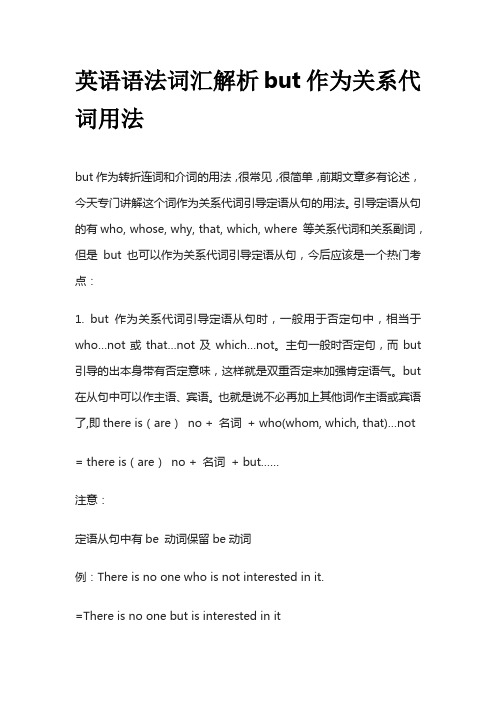
英语语法词汇解析but作为关系代词用法but作为转折连词和介词的用法,很常见,很简单,前期文章多有论述,今天专门讲解这个词作为关系代词引导定语从句的用法。
引导定语从句的有who, whose, why, that, which, where 等关系代词和关系副词,但是but 也可以作为关系代词引导定语从句,今后应该是一个热门考点:1. but 作为关系代词引导定语从句时,一般用于否定句中,相当于who…not或that…not及which…not。
主句一般时否定句,而but 引导的出本身带有否定意味,这样就是双重否定来加强肯定语气。
but 在从句中可以作主语、宾语。
也就是说不必再加上其他词作主语或宾语了,即there is(are)no + 名词+ who(whom, which, that)…not= there is(are)no + 名词+ but……注意:定语从句中有be 动词保留be动词例:There is no one who is not interested in it.=There is no one but is interested in it没有人不对他感兴趣。
(but在从句中可以作主语)反过来,定语从句中有助动词(can,will,may,should…)保留该助动词。
There is nothing that he can not do.=There is nothing but he can do.没有什么事是他做不来的。
(but在从句中可以作宾语)定语从句中有do,does和did等助动词时,先去掉助动词,再依时态人称将之后的动词还原。
There is no book which he doesn't like to read.= There is no book but he likes to read..没有一本书是他不想看的。
There is no man but wants to spend Spring Festival with family.=There is no man who does not want to spend Spring Festival with family. 大家注意原句中用的是wants.没有一个人不想和家人一起过春节。
初中but的用法总结

初中but的用法总结
在英语中,but是一个非常常见的词,它可以用来连接两个句子或词组,表达相反和对比的意义。
那么,初中阶段的学生应该如何正确
地使用but呢?下面我们来总结一下but的用法。
1. 表示相反
but常常用来表示与前面所说的相反的内容,这样可以增加语言的对比效果,有时候还可以用来转折思路。
例如:I am hungry, but I don't want to eat anything now.(我很饿,但我现在不想吃什么。
)
2. 表示限制
有时候but会表示一种限制,通常用于表示某种情况的反面,或
者是对前面所说内容的一种补充、限制或修正。
例如:I like candy, but I only eat it on special occasions.(我喜欢糖果,但我只吃在特殊的场合。
)
3. 表示转折
but也可以用来表达转折,这时它通常出现在两个独立的从句之间,用来比较两者之间的不同之处。
例如:He is smart, but he is lazy.(他很聪明,但他很懒。
)
4. 表示惊讶
有时候but也可以用于表示惊讶的情绪,用来表达某种出乎意料
的情况。
例如:I thought I was going to fail the test, but I got
an A!(我原以为我会考砸,但我得了A!)
总之,but是一个非常常用的单词,在初中英语中也是必不可少的。
初中生在掌握but的用法后,可以更加自如地进行文章描述和表达自
己的想法,达到更好的语言表达效果。
- 1、下载文档前请自行甄别文档内容的完整性,平台不提供额外的编辑、内容补充、找答案等附加服务。
- 2、"仅部分预览"的文档,不可在线预览部分如存在完整性等问题,可反馈申请退款(可完整预览的文档不适用该条件!)。
- 3、如文档侵犯您的权益,请联系客服反馈,我们会尽快为您处理(人工客服工作时间:9:00-18:30)。
2020年中考英语重点词汇复习:浅谈BUT的用法精编版
浅谈BUT的用法
两道中考题是这样的:
1. Jim is an American __________ he can speak very good Chinese. (湖南)
A. if
B. so
C. but
D. because
2. ——Excuse me. Do you have a table for two?
——I'm sorry, ________there aren't any seats now. Would you mind waiting for a while? (北京东城区)
A. but
B. and
C. or
D. so
两道中考题的答案分别是1C,2A,均是考查同学们对but的掌握情
况。
But是初中英语课本中的重要单词,为各地中考命题者所青睐。
现本文就but一词在初中英语课本中的用法作进一步归纳:
一、用作连词。
意为“而、但是、可是”等,表示语义的转折。
如:
It has no arms, but its hands turn round and round. 它没有臂膀,但它的手却能转啊转的。
His office is in New York, but he is often away. 他的办公室在纽约,但他经常不在。
There were a lot of people and much noise there. But all this was nothing to him. 那里(街上)人很多,嘈杂声很大。
但是这一切对他来
说都无所谓。
二、用作介词。
意为“除……之外”,大致相当于except,多和no,nothing,nobody,all,everyone,everything,anybody,none等表示整体概念的词连用,或置于疑问词what,who,where等之后。
如:
There is nothing but a card in it. (盒子) 里面除了一张卡片外
什么也没有。
Nobody knew it but me. 除了我以外没有人知道这件事。
Who but a fool would do that? 除了傻瓜外谁会干那事?
I have no dictionary but this one. 我只有这一本词典。
三、用作副词。
意为“仅仅”,相当于only。
如:
He left but an hour ago. 他一小时前才离开的。
She is but a child. 她不过是个孩子。
I only regret that I have but one life to lose for my country. 我唯一感到遗憾的是:我仅有一次生命可献给祖国。
四、but 还可置于表示歉意的话之后,引出向对方提出的请求或可能
令对方不愉快的话语。
它没有实际意义,只起连接作用,可省略。
如:I'm very sorry, (but) I can't come. 很抱歉,我不能来了。
Excuse me, (but) can you tell me how to get there? 劳驾,能告
诉我去那儿怎么走吗?
五、与but构成的常见短语有:
a) not…but…(“不是……而是……”),这是一个连词词组,当其连接两
个主语时,句子的谓语单数形式根据就近原则来定。
如:
Not you but he is wrong. 不是你,而是他错了。
She is not a student, but a worker. 她不是学生,而是工人。
b) not only…but also…(“不但……,而且……”),也用来连接两个相
同的句子成分。
连接主语时,其谓语动词的单复数也根据就近原则来定。
如:
He speaks not only English but also Japanese. 他不但讲英语,也讲日语。
Not only he but also I am late for the meeting. 不但他开会迟到,我也迟到了。
c) cannot help but do sth.表示“情不自禁做某事”,其中的help亦
可省略,也可以说cannot help doing sth.。
如:
When the foreign visitors see the Great Wall in China, they cannot help but think.(美国口语)
当外国游客看到中国的长城时,他们不禁浮想联翩。
When the foreign visitors see the Great Wall in China, they cannot but think.(正式用语)
When the foreign visitors see the Great Wall in China, they cannot help thinking.(普通说法)。
